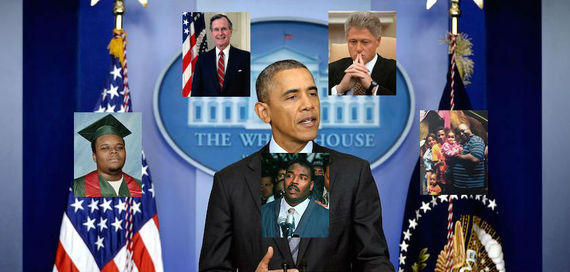
Does this sound too familiar? “I urge all Americans to approach this situation with calm, with tolerance…the Department of Justice has been monitoring this case since its inception as is customary in these kinds of situations. The Justice Department moved last night to accelerate the investigation that it started several months ago.” It wasn’t Barack Obama talking, but the president could have used this script for Michael Brown or Eric Garner or how many other names of black men. That was actually George Herbert Walker Bush calling “for calm and tolerance” in 1992, responding to the verdict in the Rodney King case. “What you saw and what I saw on the TV video was revolting. I …

Does this sound too familiar? “I urge all Americans to approach this situation with calm, with tolerance…the Department of Justice has been monitoring this case since its inception as is customary in these kinds of situations. The Justice Department moved last night to accelerate the investigation that it started several months ago.”
It wasn’t Barack Obama talking, but the president could have used this script for Michael Brown or Eric Garner or how many other names of black men. That was actually George Herbert Walker Bush calling “for calm and tolerance” in 1992, responding to the verdict in the Rodney King case. “What you saw and what I saw on the TV video was revolting. I felt anger. I felt pain. I thought: How can I explain this to my grandchildren?
“Civil rights leaders and just plain citizens fearful of and sometimes victimized by police brutality were deeply hurt. And I know good and decent policemen who were equally appalled.
“I spoke this morning to many leaders of the civil rights community. And they saw the video, as we all did. For 14 months they waited patiently, hopefully. They waited for the system to work. And when the verdict came in, they felt betrayed. Viewed from outside the trial, it was hard to understand how the verdict could possibly square with the video. Those civil rights leaders with whom I met were stunned. And so was I, and so was Barbara, and so were my kids.
“But the verdict Wednesday was not the end of the process. The Department of Justice had started its own investigation immediately after the Rodney King incident and was monitoring the State investigation and trial.”
Here is another presidential script on the issue:
“I didn’t sit there and listen to all the evidence, but I know most people in America of all races believe that if it had been a young white man in a young all-white neighborhood, it probably wouldn’t have happened. That doesn’t mean they were guilty under criminal law and the Justice Department is looking into that, in the Civil Rights Division and that’s the way to handle that. But what it does mean is there’s this huge gulf out there still in too many places where people wonder if they can be treated fairly.”
That one was Bill Clinton on Amadou Diallo. Perhaps he should save the draft for his wife–if she gets lucky and has to one day make the proverbial presidential comment. It is easy to become a cynic when reading those comments and seeing how closely they resemble the words of President Obama — even considering his push for body cameras on cops. Actually, Bush’s words were arguably more passionate than what we’ve heard from Obama who inevitably can’t escape a higher expectation to address this issue. In fact, the elephant in the Oval Office in response to anything racial is the reality of living in the age of the first black president.
However, something does feel different in the reactions to Ferguson and Eric Garner when talking to some local lawmakers and reporters in Bush-Obama counties. For example, “South Carolina may well be ahead of the curve,” writes Brian Hicks in an article from The Post and Courier in Charleston, a Bush-Obama county. Hicks is referring to the two black state senators, Marlon Kimpson and Gerald Malloy, who pre-filed legislation this week for all state law enforcement officers to wear body cameras. “The fact that, this is a legitimate issue being raised by our president, gives us, local officials, credibility when we speak about these issues on that state level where, historically, we’ve had so much difficulty in light of this nation’s history,” says Senator Kimpson.
Really? Even in flaming-red South Carolina. The president’s popularity may be high in Kimpson’s majority black Senate district. Statewide, it is another story. Kimpson still insists the president’s voice on this issue matters across the state. Regardless, I’ll keep hoping for the day when George Herbert Walker Bush’s words on Rodney King will be just a piece of history and not a template for a presidential script.
Read more:





















